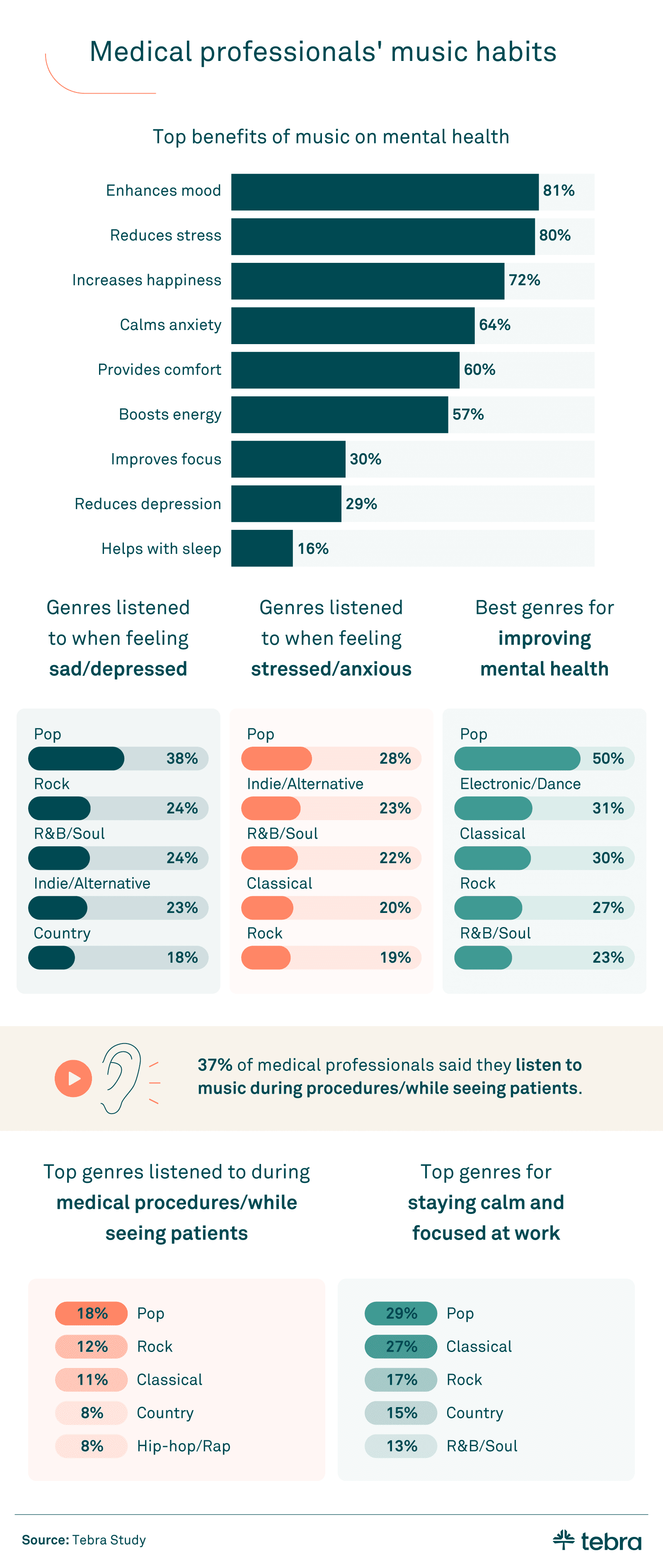Overview
- Melanie Martinez, Drake, and Billie Eilish are the top artists on mental health playlists on Spotify.
- 79% of people have used music to help them get through a dark time.
- Taylor Swift is the top artist for helping people through dark times.
- 61% of people say music calms their anxiety; 33% say pop is their go-to genre when feeling stressed or anxious.
- People who listen to country and reggae have the best mental health, with 52% of each music fandom reporting strong mental health.
- More than 1 in 10 say EDM is their go-to genre when feeling sad or depressed.
- About 1 in 3 healthcare professionals think EDM is the best genre for improving mental health.
Can music truly heal the mind? Tebra's latest study explores this powerful connection, revealing the top artists and genres people turn to for emotional support. As mental health awareness grows, understanding music's role in enhancing well-being becomes increasingly relevant.
Tebra's survey of over 1,000 people and analysis of more than 68,000 Spotify tracks provide insights into the most popular songs and genres for supporting mental health. Keep reading to discover top artists, track characteristics, and the benefits of music according to the general public and medical professionals.
The characteristics of mental health playlists
This first section explains the key features of music commonly found in "mental health" playlists on Spotify. We'll focus on the artists, songs, and genres that define them.

Music on mental health playlists typically had a neutral or low average valence of 0.432, suggesting that these songs conveyed melancholic or serious tones. This could evoke feelings of introspection or mild emotional depth. The average tempo was 123 BPM, which is moderately upbeat, providing a lively and energetic feel to the playlists.
Top artists on mental health playlists included Melanie Martinez, Drake, and Billie Eilish. Popular tracks featured "The Night We Met" by Lord Huron, "Washing Machine Heart" by Mitski, and "Lovely" by Billie Eilish and Khalid. These selections highlight the balance between emotional depth and rhythmic vitality that characterizes popular mental health music.
The impact of music on mental health
Next, we'll look at the music people turn to during challenging times and the health benefits they experience from tuning in. We also asked music fandoms to self-report their current mental health status.

A significant 79% of people reported using music to help them navigate difficult periods in their lives, with Taylor Swift emerging as the top artist for helping people through dark times. For calming anxiety, 61% found music effective, with 33% of those preferring pop music and 36% turning to rock.
As for genres, people who listened to country and reggae reported the best mental health, with 52% of each music fandom indicating strong well-being. In contrast, listeners of indie/alternative and heavy metal reported the worst mental health, with 30% and 28%, respectively, saying their mental health was poor. Additionally, more than 1 in 10 people identified EDM as their preferred genre when feeling sad or depressed.
The benefits of music according to the professionals
Medical professionals not only recommend music for mental health but also practice what they preach. This section explores their insights on the best genres for mental well-being and their personal listening habits during work.

Medical professionals highlighted several top benefits of music on mental health, including enhancing mood, reducing stress, and increasing happiness. They identified pop (50%) as the best genre for improving mental health, followed by EDM (31%).
When feeling stressed or anxious, medical professionals reported listening to pop music most often. Additionally, 27% reported that classical music helped them focus and remain calm at work, while nearly 1 in 10 (8%) turned to EDM for the same purpose. During medical procedures or while seeing patients, 18% of professionals chose pop, and 12% preferred rock, indicating these genres' ability to create a conducive work environment.
The healing power of music
Music's profound impact on mental health is undeniable. From Taylor Swift helping people through dark times to the calming effects of pop and rock music, it's clear that the right tunes can enhance well-being. Tebra's study illustrated how different genres and artists support mental health, with medical professionals also recognizing music's benefits in their practices.
As we continue to navigate the complexities of mental health, integrating music into our daily routines can be a powerful tool for improving mood, reducing stress, and increasing happiness. Whether you're seeking solace in melancholy melodies or finding energy in upbeat tempos, music remains a universal remedy for the mind and soul. Remember, the right song can make all the difference.
Methodology
Tebra surveyed 208 medical professionals and 793 Americans to explore the benefits of music on mental health. We also used the Spotify API to analyze 68,053 songs across "mental health" playlists to see the most common genres, artists, songs, and characteristics of music in these playlists.
About Tebra
In 2021, with a combined mission to unlock better healthcare, Kareo and PatientPop joined forces to form Tebra — a complete practice automation solution for independent healthcare providers. With an all-in-one, purpose-built platform to drive practice success and modernize every step of the patient journey, Tebra provides digital tools and support to attract new patients, deliver modern care, get paid quickly, and operate efficiently. To learn more about how Tebra is committed to improving patients' and providers' success and well-being, visit www.tebra.com.
Fair use statement
This data is provided for noncommercial use only. If you plan to share it, please link to this source.








